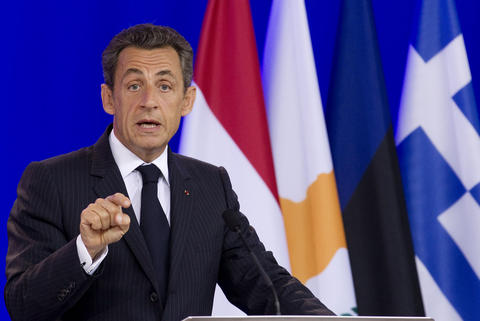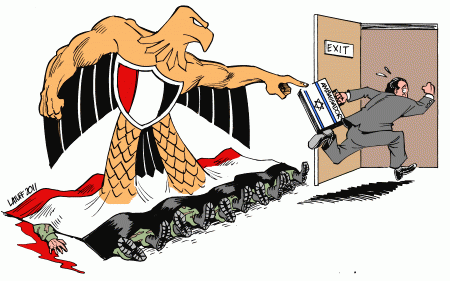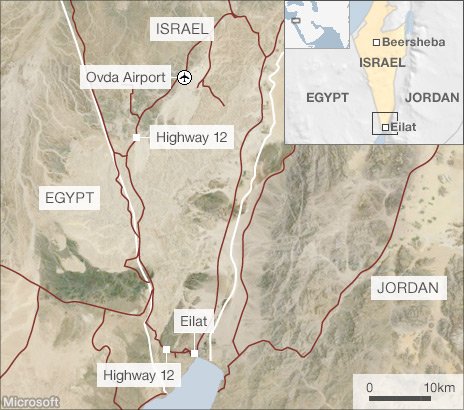EDITOR: On the road to nowhere, again…
So, once again, Israel holds a debate with itself, excluding not only the rest of the world, but specifically, the Palestinians. Well, what else is new? it is what Israel did for decades; they prefer to debate with a side which agrees with it. In this case, while the Israeli public is far from being in agreement with its government about most issues, it is still slavishly synchronised with its refusal to engage with realities in the Middle East, or to properly discuss how the occupation may be brought to an end, and how a just peace may be approached. Having behaved like an ostrich for over six decades, why change now?
So, we can look forward to more denial, more bloodshed, more misery for all in Palestine and Israel. But the world around Israel is not the same that it was for decades – most people outside of Israel have noted this, of course; the Arab Spring might not be an overnight utopia, but it is far from over, and far from being written off as a failure. Indeed, to date, it has achieved much more than the world-famous 1968 in Paris, which in hindsight looks like a deflated balloon, despite all the hype. So, in the new and still forming Middle East, moving painfully towards democracy, Israeli dependence and reliance on dictators and potentates for its continuation of occupation ans apartheid seems somewhat less safe than it was last year. Indeed, the Israeli Jewish population itself was amazingly fired into radical action by the Arab Spring surrounding it… that their tame uprising and calls for ‘social justice’ seem to have excluded the main political issue of the occupation of Palestine is evidence of the difficulties of the so called “Jewish Democracy” in Israel, a democracy for Jews only. What we can advise the Israeli ‘radicals’ in their dwindling tents, is another session of education, concentrating on colonialism and imperialism this time, which may bring some better understanding of the hell they created for themselves and the Palestinians. There is little chance for this taking place, though. They are likely to continue fighting for reducing the price of cottage cheese, thinking this is a struggle for ‘social justice’.So, the protesters include the settlers, who are now being massively armed in order to stop any Palestinian protest after September 20th. This is NOT Socialism; this is Nazional-Socialism!
Well, it is easier to fight over the price of cheese, that to face six decades of colonial, racist policies and actions. Mirror, mirror on the wall, who is the fairest of them all?
The Israel-Egypt junta alliance: Haaretz
Now Israel stands in fear and trepidation, counting the days until the Camp David agreement with Egypt comes crashing down.
By Zvi Bar’el
We were shocked. Suddenly we were told that Egypt is being run by a “military junta.” We were also surprised to discover that after 33 years of peace, the peace agreement was signed with a dictator, and that we continued on with the dictator who followed him after he was assassinated. And now this peace is about to collapse, because the dictator is gone and the junta has arrived.
Now Israel stands in fear and trepidation, counting the days until the Camp David agreement with Egypt comes crashing down. In Israel, the peace agreement is perceived as a prelude to war. Even if another 100 years pass after its signature, it is a threat.
So here is the solution: Instead of getting excited every morning about Egyptian statements regarding a “reevaluation” of the Camp David Accords, and instead of waiting around in fear for the moment when Egypt will announce a demand that the agreements be changed, Israel should initiate a cancellation of the peace agreements with Egypt and Jordan, until those countries have a genuine democracy or real dictatorship of the sort that Israel knows how to cooperate with.
We would, of course, very much like to see a military junta stay on in Egypt, under General Tantawi, managing affairs and keeping Tahrir Square from deciding who will lead the country. Peace with Egyptian citizens is much more expensive than peace with a junta or with a dictator. The people demand peace with the Palestinians, withdrawal from the territories, the demarcation of borders, and the rest of the demands that the dictators did not insist on. But how is it possible to continue living in peace with a military junta that answers to the voice of the street?
The truth is that we actually like military juntas. In Turkey we loved the junta that bought drones from us, upgraded its tanks and cooperated with us on intelligence. But now the country is led by a “civilian junta,” an “Islamic” one that was elected democratically. And, once more, surprise: It turns out that even a democracy is not the magic solution. It is even dangerous for ties between countries. In Egypt, we liked Hosni Mubarak because he was part of the military establishment, and we also liked also Anwar Sadat who preceded him. King Hussein relied on his army, and when he signed the peace agreement with Israel he did not consult the Jordanian people.
We liked military juntas in the Arab world, and in Chile, Argentina and Ethiopia. Military juntas speak a similar language. They understand one another; their interests are narrow and specific; they are scornful of civilians, certain that without them their countries will fall into chaos, and that civilian politics – democracy – is a recipe for the country’s collapse. Juntas operate in the name of a desired value that is supreme to all other values: security. All the rest – education, health, social services, civil rights – can exist only if the junta ensures security.
“The nation and the army together,” demonstrators cried in Tahrir Square.
Our junta would love it if Rothschild Boulevard would burst like a bubble. Civilians with round glasses, three-quarter-length pants, some of whom never served in the army, some smoking illegal grass, would then get their hands off the junta’s money-box and stop interpreting, without any authority, the holy budget, and especially the sections on defense.
Our junta wants the public to raise red banners like the ones in Tahrir Square, calling out, “The nation and the army together” – but with its interpretation. The people must not stick their hands in the army’s pockets.
The difference between Egypt and Israel is that here there are two military juntas: the one that is appointed and the one that is elected. There is one that shapes the internal policy of the state through the enormous budget that it claims for itself, and there is one that approves these budgets for its twin. There is the one that goes to war to defend the homeland, and the one that determines what the borders of the motherland are that the army must defend.
In Egypt, the military junta does not camouflage itself, even when it moves into ministries. Those who carried a military rank continue to take pride in it also as “civilians.”
In Israel, of the twin juntas, one wears uniforms and ranks, and the other wears suits and ties – but it is the same generals. And here is another discovery: That same junta that is now running Egypt would not have taken over were it not for the civilian mutiny that threw out the previous regime. Egypt did not undergo a military revolution, but a civilian one. The army is the one who extended a hand to the civilians. But this is Egypt, and it has never served as our model. It is, after all, a dictatorship.
French giant Veolia cut down to size for abusing Palestinian rights: The Electronic Intifada
Maren Mantovani and Michael Deas 26 August 2011

The French corporation Veolia once appeared unassailable; today it is ailing. It is faced not only with the global economic crisis but also the growing impact of the boycott, divestment and sanctions (BDS) campaign against its involvement with Israeli apartheid infrastructure and transport projects. A recent merger between Veolia’s transport division and a subsidiary of the main French state investment fund indicates French industry and government have united to find a simple solution to Veolia’s problems: let the taxpayers finance Veolia’s income losses — and its complicity with Israeli war crimes and human rights abuses against the Palestinian people.
On 4 August, Veolia management held a conference call with major financial analysts to defend the company’s latest figures. It wasn’t an easy task. Veolia’s management was forced to gloss over the terrible financial situation of the group that has forced it to draw up sharp cost reduction plans, initiate a complete restructuring of management, plan the pullout from more than forty countries and search for more investors to cover a high debt.
Veolia has lost more than 50 percent of its share value since March 2011, according to tear sheet data from The Financial Times (“Marketdata: Veolia Environnement Ve SA,” accessed 25 August 2011).
However, among the underlying financial data discussed — €67 million ($96 million) in net loss during the first half of this year; €15 billion ($21.6 billion) net debts; €250 million ($360 million) yearly cost reduction — one number did not come up: the massive financial damage the company has faced at the hands of the BDS movement. Since the beginning of the Palestinian-led campaign in 2005, Veolia has lost contracts worth more than €10 billion ($14 billion) following high profile campaigns.
Veolia’s chief financial officer Pierre-Antoine Riolacci had to admit that its municipal services are suffering a downturn in some countries “in particular with pressure on the downside, namely in the UK where things are rather difficult.”
Ignoring London loss
Surely the CFO had heard the news from across the English Channel the day before the conference call, where Veolia had failed to be selected for a £300 million ($493 million) contract by Ealing Council in London following a determined campaign by the local branch of the Palestine Solidarity Campaign.
The worldwide campaign against Veolia was initiated in response to the company’s five percent stake in the consortium that is constructing the light rail project that links West Jerusalem with illegal Israeli settlements in occupied East Jerusalem and the surrounding West Bank, thereby cementing Israeli colonization and creating the necessary infrastructure for its further expansion. Moreover, Veolia holds a thirty-year contract for the operation of its first line, due to open later this month. Veolia and its subsidiaries also operate bus services, waste management and a landfill all deep within the occupied West Bank, and all for the use of Israeli settlers. All of these projects contribute to war crimes, as defined by the Fourth Geneva Convention and the Rome Statute of the International Criminal Court.
Refusal to withdraw from Israel
Despite its apparent desperation to reduce costs, Veolia has yet to implement the most effective cost reduction strategy it could: including Israel in the list of countries it plans to withdraw from. Rather than divesting from Israeli colonization of Palestinian land, Veolia is turning to the French state for financial assistance, involving public money in operations abetting Israeli war crimes.
This spring Veolia Transport merged with Transdev into a newly created company Veolia Transdev (“Veolia Transdev: Creation of the world’s leading private-sector company in sustainable mobility,” press statement, 3 March 2011).
Transdev was a subsidiary of the French Caisse des Dépôts (CDC), a public investment authority that manages public funds and is overseen by the French parliament. The CDC is now a 50 percent partner in the newly created Veolia Transdev transport company. According to Veolia’s Pierre-Antoine Riolacci, the entrance of Transdev intp the group has allowed Veolia to “cut back our debt by €159 million [$229 million].” The degree to which Veolia Transdev has come under the protection of the French state is evident in the fact that during the conference call, Veolia Transdev issues were directly dealt with by the CDC’s chief executive Jerome Gallot.
On its website, CDC boasts that it exists to “serve the general interest and the economic development” of France. But pumping French tax money into Veolia to make up for its financial troubles, thus allowing it to push forward projects that serve illegal Israeli population transfers into occupied Palestinian territory, is unlikely to help attain either goal. Moreover, the Jerusalem light rail project contradicts French government policy that East Jerusalem should be the capital of a future Palestinian state. Promoting the project in 2005, then Israeli Prime Minister Ariel Sharon stated, “This [light rail] should be done … to strengthen Jerusalem, construct it, expand it and sustain it for eternity as the capital of the Jewish people and the united capital of the state of Israel.”
Even before its partial ownership of Veolia Transdev, CDC was involved in the light rail project through its subsidiary Egis Rail, which won a contract in 2008 to assist with managing the project. The current role of Egis Rail is unclear.
Private companies have long been heavily involved in Israeli violations of Palestinian human rights, such as building and maintaining the illegal settlement infrastructure, and the wall built on Israeli-occupied Palestinian land in the West Bank. But by investing in Veolia, the French government is bucking a recent European trend of governments to start ensuring public enterprises and institutions are not complicit with Israeli violations of international law.
The German government recently responded to public pressure by taking steps to end the state-owned company Deutsche Bahn’s involvement in the construction of a train line from Jerusalem to Tel Aviv passing through the occupied West Bank. Explaining its intervention, the German transport ministry pointed to the “potentially illegal” nature of the project and the fact that it is inconsistent with government policy toward Israel and the Palestinians (“Letter from German government to Die Linke parliamentarian concerning A1 train project,” 10 May 2011). The German foreign ministry has admirably published an alert on its website warning German companies about the potential legal consequences of Israeli projects in the occupied West Bank (“West Bank, Economy”).
Precedents set by other European capitals
The Norwegian government took a precedent-setting step when it excluded Elbit Systems from its investment portfolio. Elbit is an Israeli arms company involved in the construction of Israel’s illegal wall in the West Bank. It subsequently also excluded Africa Israel and Danya Cebus, two companies which build illegal Israeli-only settlements in the West Bank (“Norwegian government pension fund excludes more Israeli companies,” 23 August 2010).
The British government also took a stand on the issue when, in 2009, the foreign ministry pulled out of a deal to rent office space for its embassy in a building owned by Lev Leviev, the Israeli diamond tycoon who owns Africa Israel and finances development of illegal settlements in the West Bank. The British government also withdrew export licenses to Israel from UK arms companies that provided the Israeli military with weapons or components that have been used during the winter 2008-09 attacks on the Gaza Strip (“Israel arms licenses revoked by Britain,” The Huffington Post, 13 July 2009).
In September 2009, the Spanish government excluded Ariel university from a state-sponsored architecture competition after having become aware that it was located in an illegal settlement.
The French government, however, has so far failed to take action to end such complicity. By doing so, France is not only undermining important precedents set by its allies. It also violates its obligations under international law and the voluntary commitments it has made regarding good governance and corporate social responsibility.
France must honor obligations
When the International Court of Justice ruled on the illegality of Israel’s apartheid wall and related infrastructure in the occupied West Bank, it also ruled that third party states are obliged not to aid or assist the maintenance of the unlawful situation created by Israel or infringements of the right to Palestinian self-determination. Two companies owned by the French state fund CDC — Veolia and Egis Rail — are involved with and profit from such unlawful acts. This calls France’s commitment to international law into question.
In June, the United Nations Human Rights Council approved its new Guiding Principles for the implementation of the Protect, Respect and Remedy Framework, designed to help states and businesses understand their duty to prevent corporate abuse of human rights and their obligations under international law (“Guiding Principles on Business and Human Rights: Implementing the United Nations ‘Protect, Respect and Remedy’ Framework,” 21 March 2011).
According to these principles, “states should take additional steps to protect against human rights abuses by business enterprises that are owned or controlled by the state … [including by] denying access to public support and services for a business enterprise that is involved with gross human rights abuses and refuses to cooperate in addressing the situation.”
Involvement in the light rail project also violates the Organization for Economic Cooperation and Development’s guidelines on multinational companies. Considering that Paris is the seat of the OECD, this is particularly ironic (“OECD Guidelines for Multinational Enterprises,” 2008 [PDF]).
The OECD guidelines call for companies to “respect the human rights of those affected by their activities consistent with the host government’s international obligations and commitments.” Israel’s settlements and associated infrastructure violate several key international law treaties, including the Fourth Geneva Convention, the International Covenant on Economic, Social and Cultural Rights and the International Covenant on Civil and Political Rights, all of which have been ratified by Israel and France.
The French government has become a shareholder in Veolia in full knowledge of that company’s role in supporting Israeli occupation and colonization of Palestinian land. The principal victims of this French policy are the Palestinian people. However, this development should also be of concern to all those who believe in the importance of a functioning system of international law and the implementation of human rights standards. The French people, whose taxes have financed the Veolia Transdev merger, should be especially concerned.
It will be up to campaigners in France and all around the globe to stop governmental buy-ins to illegal operations of private or state enterprises. It will be their task to ensure that the Transdev deal will not be enough to shield Veolia from the impact of the BDS movement’s demand for accountability. The group is in financial trouble and its CFO has admitted that Veoila is losing municipal service contracts in cities and regions that have seen meticulous grassroots campaigning. In December, Veolia will present the full list of countries which it is leaving (“Veolia to leave 37 countries as loss spurs quicker revamp,” Bloomberg, 4 August 2011).
This might be another chance for the company to show that it has learned that failure to respect human rights and the Palestinians’ right to self-determination comes with a price.
Maren Mantovani is coordinator for international relations with Stop the Wall, the Palestinian Grassroots Anti-Apartheid Wall Campaign.



